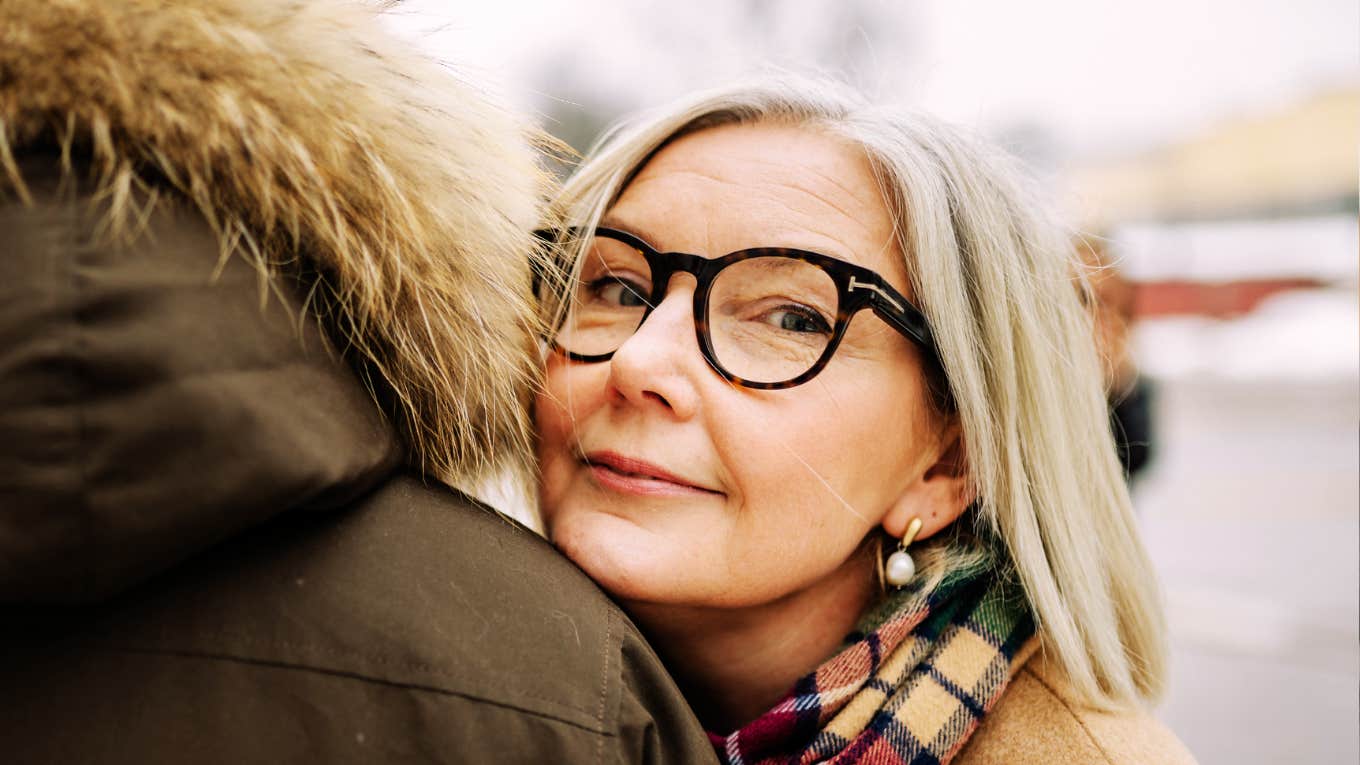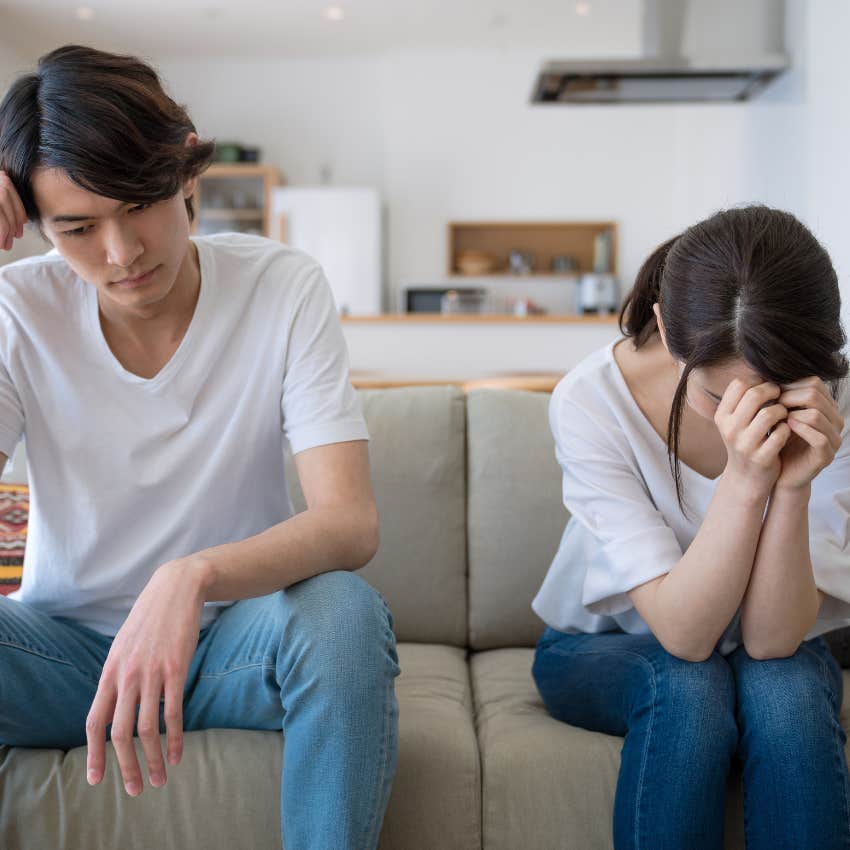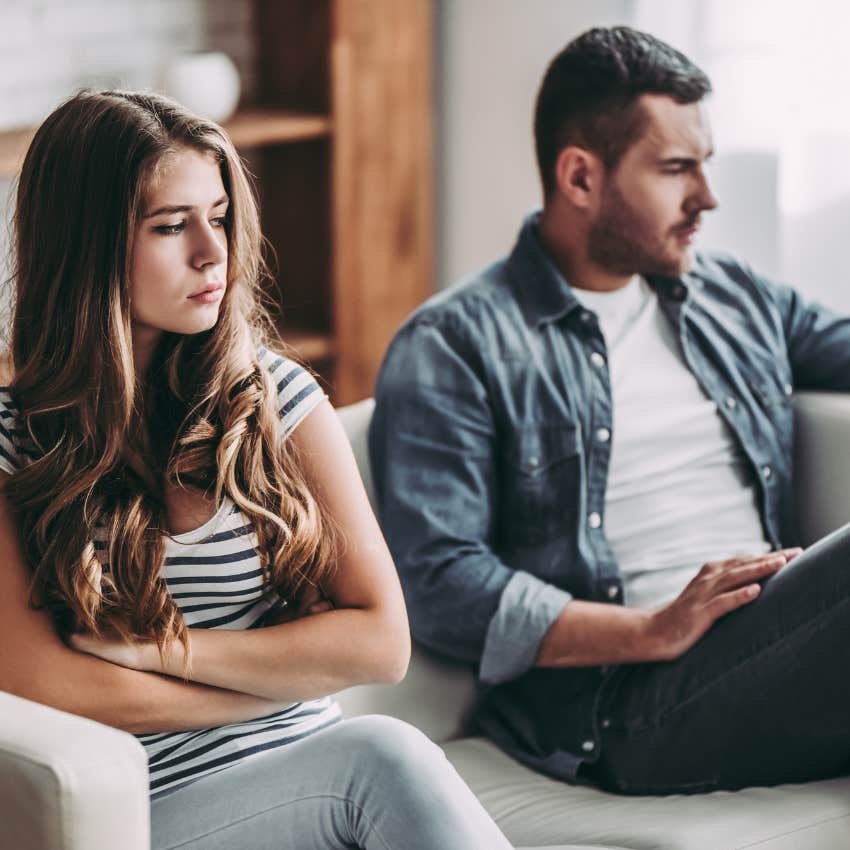The Real Test Of Love Is Who You’d Want Beside You When Your Parents Die
It's easy to love someone when life feels light.
 Yan Krukau | Canva
Yan Krukau | Canva When my mother found out she was dying last fall, and before she lost her ability to speak, she told my husband, John, that she was handing him the torch of taking care of me. Some might bristle at the connotation that I, an adult woman, can’t take care of myself.
But I believe independence is an oversold virtue. Humans are social creatures, and we rely on each other’s love and support. Plus, as someone who’s struggled with my mental health since I was four years old, she had a right to be worried.
While I lost my mother far too young, I am grateful that if I had to lose her in such a traumatic way, it happened once I was married. The funny part is that I was supposed to be married to someone else.
I met the man who would become my first fiancé back in early 2019.
Let’s call him Ben, which is the pseudonym I also used in my nonfiction book, Overthinking About You: Navigating Romantic Relationships When You Have Anxiety, OCD, and/or Depression.
We met at what I considered to be the perfect time. After years of struggling to date without losing complete control of myself and my mental health, I finally felt more secure and stable. For the first time, someone’s lack of interest in me wasn’t a clear indicator that I sucked and would be alone forever. My entire day didn’t hinge on how quickly someone answered my texts.
This new mindset made dating less dangerous and me less miserable. I credit a combination of psychotropics and newfound self-esteem for this transformation. Was I still obsessed with getting married as quickly as possible? Absolutely. But perfection doesn’t exist.
My first year with Ben was what I had been impatiently waiting for since elementary school. He was tall, funny, and close with his family, whom I liked.
We officially moved in together after eight months and were on a steady path toward building a life together. For our first anniversary, we went to Benihana and delightedly watched as our chef showed off his knife skills. After learning it was our anniversary, someone asked how long we’d been together.
Their face changed when I proudly shared one year. I could tell they no longer took our relationship that seriously. To them, one year meant nothing. I remember thinking, boy, are they wrong. They didn’t understand how strong our foundation was. I had come so far to get here. We were going the distance.
Ben and I didn’t even make it to our second anniversary.
Six months after he proposed with an elaborate scavenger hunt in our apartment, Ben broke up with me during an episode of the hit show, Lucifer. The contrast between the level of planning for these two events was probably an indicator of how much his feelings had changed.
While the proposal had been carefully organized with attention to detail, our breakup conversation was clunky and impulsive. It was November 2020, and we hadn’t been having a great time lately. But neither had the rest of the Covid-locked-down world.
I’d attributed our disconnection to forces outside of our relationship. I remember a furtive phone call with my mom when I told her things had been off lately, but I wasn’t too worried about it. She encouraged me to address it, but I brushed her off.
I realize how much of a privilege it was to be able to disregard motherly advice now that my life is devoid of it. Not to mention that she was right.
 metamorworks / Shutterstock
metamorworks / Shutterstock
Despite my preference for avoidance, Ben and I ended up having a tough conversation about the state of our relationship the day my grandma died. (These two things were unrelated, but are burned together in my memory. Sometimes I think about how strange it is that unless the afterlife is real and provides access to our world, my grandma still thinks I ended up with the guy that dumped me during a TV show about the devil.)
I asked him to be more loving to me, and he complied, and I agreed to make some shifts to my behavior so he would be less annoyed. I told my mom on another call that things had improved and there was nothing to worry about. For someone who considers herself incredibly perceptive, it’s alarming how much I got wrong.
After years of feeling so unsafe in relationships that my insecurity drove my partners away, the moment I relaxed and didn’t assume the worst was the moment the rug was ripped out from under me as my engagement ring was slipped off my finger. I never saw my first fiancé again after that night.
We had a FaceTime the next day when he reassured me he wasn’t planning to date again for six months or a year. (Why are you even talking about that right now? I wanted to scream.)
We had a regular call a few days later, where I furiously wrote down what he said because I knew I wouldn’t be able to remember it later. High emotions tend to jumble the brain.
The greatest hits from this conversation included, I can’t pinpoint this thing; it wasn’t abrupt for me, and I crave commitment (just not with me). Our final interaction was a strategic email about the mail that I only sent, so he would realize his mistake and return it to me. It was ineffective.
The strangest part of the breakup with Ben is that almost immediately, I knew I was going to be okay. This is extra bizarre because so many things about the way we ended were unnecessarily painful. He kept his doubts from me until he made up his mind to leave. I had to be the one to initiate the conversation that unexpectedly led to our breakup.
He never checked in on me, even though I had a history of suicidal ideation and was now isolated in what was once our shared home. I couldn’t even hug my friends because of COVID.
They just helplessly reached for me as I cried six feet away. And yet … unlike other times my heart had been stomped on, I knew this wasn’t the end of the world or the end of my love story. All the work I had done on myself was paying off, and somehow, I got myself and my dog on a plane to New York to see my family.
What happened in those next few months, as I burrowed into the safety of my parents’ house, would change the course of my life.
The future I had planned was gone without my input or consent. I had no choice but to figure out a new one. I also had to massively rewrite my upcoming book. The original first draft of Overthinking About You ended with a chapter that heavily featured Ben and was titled “How To Make A Relationship Last.”
Since I no longer had any idea how to do that, I wrote an entirely new chapter entitled “How To Not Give Up.” Looking back, this chapter made the book stronger because ultimately the goal of Overthinking About You was to help people survive an entire life filled with uncertainty — even when our brains insist we aren’t strong enough to handle it.
Two other significant things happened in that house, where a few years later, my mom would rapidly decline. The first was when my dad started making jokes that I should find a new groom in time for my original wedding day.
I found this so amusing that I pitched it as a movie idea on my social media. The response was fervent, so I tucked it away in my writer brain. The second was that I matched with the man who would eventually become my second fiancé and current husband.
Don’t worry, despite my father’s suggestion, we didn’t get married on the same day I was supposed to marry Ben. We got married one year and 51 weeks after my original date. Clearly, I love an August wedding. But let's back up.
When I returned to Los Angeles in late February of 2021, I didn’t yet know what an impact those two events would have. After a month of long-distance dating, there was still the possibility that John and I wouldn’t hit it off in person.
What if he smelled? What if I smelled? What if he was turned off by the knee brace and cane that I had to use after my knee dislocated in the JFK airport bathroom on my return flight to California?
Why had my knee decided to do this in the first place? Was the number of bad things that kept happening to me a fluke or proof of some sort of curse? The stakes felt uncomfortably high, and I went into our first in-person date not filled with excitement but consumed with dread.
The beginning of my relationship with John was the exact opposite of what I had been told a great romance should feel like.
I was still in love with someone else. I hadn’t gotten over my brand-new abandonment issues. And I was very mad that I had to start again from zero with someone, mostly because that meant I had to hide the extent of my stomach issues. Limerence, this was not.
Instead, it was an honest and raw coming together of two people in their thirties who had both been left by the person they thought they would grow old with. (His long-term, live-in partner had abruptly left him a few years prior.)
I didn’t need to hide my baggage from John. Instead, I poured it out on the kitchen table and let him sort through it, rearranging the bits until they fit together much more easily. I like to think I did the same for him.
As I began to sink into this new relationship, despite my discomfort, I was forced to examine how my feelings around marriage had changed. If you could never be truly safe in a romantic partnership, like I had just harshly learned, what was the point of legally binding yourself to each other?
People loved to tell me I was so lucky that my breakup had happened before the wedding. But Ben’s actions showed me that someone can give up on you at any time. My broken engagement didn’t act as a calling card for this institution I had coveted; it served as a warning sign. And ye … I still wanted it.
My newly conflicted feelings toward marriage prompted me to write my second non-fiction book, I Do (I Think): Conversations About Modern Marriage. Through the guise of professional research, I was able to explore all the questions and fears I had about this thing I used to crave.
What does it mean to be married in modern society? Why are people still doing it? And how can you ensure yours is one of the good ones? (Spoiler: you can’t.) As I worked on the book, I also worked on rebuilding my life with someone else, despite my indignation at having to do it again.
But by the time John and I got engaged in October 2022, I was surprised to find myself free from doubt.
You’d think after what I had been through, I would be on edge, waiting for another life-changing blow to come at me during a 7.5/10 Netflix show. Instead, I felt assured that even if history repeated itself, I would once again be okay. I’d realized that to enjoy my marriage, I had to fully trust my partner.
But even more importantly, I had to fully trust myself. I could take the risk because I could handle the uncertainty that came with it.
Life isn’t about making the safest choices to avoid potential pain. It is about creating enough safety nets to be able to take big swings. Having and tending to those safety nets is the difference between being reckless and being brave. And I wanted to be brave.
Two months before my wedding, I had another life-changing event, but this time it was of the positive variety. I found out I had sold my romance novel, Save The Date, to HarperCollins in a two-book deal.
What had started as a ridiculous suggestion by my father in the darkest depths of my grief was now the backbone of my first romcom. My protagonist, Emma, is a couples therapist who decides to find a new groom in time for her wedding day after being abruptly abandoned by her fiancé.
It is a story about saving face, challenging relationship norms, and not giving up just because one person doesn’t love you anymore. I’ve been asked if it was difficult to write, given how closely it aligns with my heartbreak.
I’m delighted to report I didn’t find that part difficult at all. So much of what hurt about being left like that was losing autonomy over my planned future. But since that fateful night in 2020, I got to take back the reins in both my real life and in a fictional one.
My mother never had a clear plan for how her life would go. As someone who had such specific goals from a young age (marriage, a brilliant writing career, many dogs), I found this hard to relate to. It took me until my thirties to realize that allowing myself this freedom was a gift.
My broken engagement showed me that I could be happy in multiple versions of my life.
 4 PM production / Shutterstock
4 PM production / Shutterstock
And this revelation made it more comfortable for me to shift away from my limited self-concept as a comedy writer/performer. It allowed me to lean into non-fiction, obtain a master’s degree in psychology, and launch a relationship coaching business.
Much like my marriage, my current career is not what I was planning. There is some pain in the fact that I’ve never had the chance to write for a TV show or see myself on the big screen, but it is overshadowed by how much purpose I get from helping others navigate their uncertain relationships.
My personal experience (combined with my formal education) drastically shapes my coaching approach. Instead of focusing on how to create the best dating app profile, I teach my clients how to build tolerance for discomfort while asking them to get in touch with their core values and needs. It is messy, often challenging work, where the most important relationship to protect is the one they have with themselves.
Last summer, I had the recurring thought, nothing traumatic had happened to me in a long time. 2020-2023 had been a tumultuous period, personally, professionally, and physically (I ended up needing major knee surgery so I would stop collapsing in public places).
But for a notable time, my life had been relatively stable and, dare I say, lovely. Then my mom got admitted to the hospital in August because she had lost control of her right arm. Within weeks, she had been diagnosed with CJD, which is all the things you don’t want a disease to be: rare, untreatable, and fatal. I watched her die on September 23, 2024.
Losing my mom, who was both my best friend and first editor, put my broken engagement in a new perspective. When I lost Ben, I knew I could one day fill his role in my life with a new partner. I will never have a new mother.
What I do have, though, is a husband who sat in the room with my family as my mother took her final breaths. John’s love for me is not unconditional, nor should it be, but it’s been alive during the time I need him most.
For that reason alone, I will always be thankful I leaped, no matter what happens in the future. I once heard someone say that when you are looking for a spouse, you should look for someone who will get you through the death of your parents.
I wasn’t thinking about that criterion when I fell in love with John. But my mother was when she passed him the torch. And based on how tightly he has held it since her passing, she knew something I didn’t, once again.
Allison Raskin is a New York Times bestselling author, relationship expert, and a leading voice in mental health advocacy, in addition to being an accomplished screenwriter and content creator. Her latest book is Save the Date: A Quirky and Engaging Rom-Com of Love, Family, and Following Your Heart.

